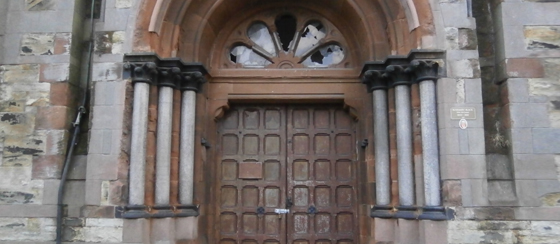
Already in Ireland some dioceses are ending the independent life of parishes with centuries of historical uniqueness behind them. The system known as ‘clustering’ typically deprives a parish of a resident clergy, obliging a dwindling number of clergy to service a number of neighbouring parishes, usually with a reduced programme of weekly masses. The next step might be to end regular weekly Mass in some churches in the cluster.
The likely consequences of this strategy for managing a gathering crisis of priestly manpower are not well known in Ireland. Many dioceses in the USA have had far longer experience. In the press release below the US lay organisation Future Church lays out its reasons for opposing this process, and appeals to Pope Francis to seek other means for addressing the manpower crisis. We in Ireland surely need to pay close attention.
~*~
Press Release from Future Church, USA, September 9, 2015
Catholics Call on Pope Francis to Keep Parishes Open

As Pope Francis makes his inaugural journey to the United States, Catholics from the United States and around the world are calling on him to help them keep parishes open.
An Open Letter to Pope Francis released today calls attention to the widespread policy of bishops to merge, cluster and close parishes and asks Pope Francis to encourage them to find ways to keep them open rather than shuttering them.
Hundreds of parishes have been merged or closed in New York City, Philadelphia, Boston, Cleveland and beyond. Recently, the Archdiocese of New York merged or closed more than 70 parishes, often in the face of staunch opposition by committed parishioners.
“When the Pope visits Our Lady Queen of Angels (OLQA) School in East Harlem in just a few weeks, he will learn that the Church was tragically closed in 2007 amid protest,” said Deborah Rose-Milavec, Executive Director of FutureChurch, an organization that provides resources and support to parishioners who want to keep their vibrant churches open.
Sadly, in the years that followed, two funerals, one for Carmen Gonzalez and the other for Carmen Villegas, both courageous leaders working to keep OLQA open, had to be held on the sidewalk in front of the closed Church when the bishop refused to unlock the doors. “It is the story of these faith-filled women and the rest of the community working to keep their parish alive, meeting the unrelenting indifference of those who are supposed to pastor that will break your heart,” said Rose-Milavec.
Today, loyal OLQA parishioners still gather for prayer services, holding together despite the odds. As the Pope stops at Our Lady Queen of Angels, these faith-filled Catholics hope he will learn how their Church closed and come to their aid. “I hope the Pope will meet with parishioners from Our Lady Queen of Angels, Our Lady of Peace Church in Manhattan, St. Peter Claver in Philadelphia, St. Francis X. Cabrini in Scitaute and other closed parishes,” said Rose-Milavec. “If he wants to learn about the devastation of faith life and the human cost of these corporate policies, he should sit with the many courageous Catholics who have been working for years to keep their parishes intact, and listen their stories.”
The petition also calls attention to similar problems that parishes face world-wide.
Father Ian McGinnity, Chairman of the National Council of Priests points out, “In Australia, which is a vast land with the tyranny of distance, many rural communities do not have resident priests and only have access to the Eucharist on a monthly basis. In our populous urban areas, parishes have had to be amalgamated due to the shortage of priests which has not only placed additional burdens on an already overworked pastor, but also has subsumed some churches unique identity and community.’
Father Helmut Schüller, spokesman for the Pfarrer-Initiative in Austria points out that the Catholic Church is at a crossroads and that those in leadership must provide the necessary priests or develop new forms of community leadership. He notes how Bishops’ conferences are keeping to their defensive administrative strategy of merging independent parishes into vast, impersonal parish associations stating, “That is pretty much the most unimaginative thing one can do,” said Schuller.
Father Wolfgang Gramer Rottenburg-Stuttgart representing the Deutsche Pfarrer-Initiative remarks, “In Germany I can see clearly that our priest numbers are declining every day. But I also recognise that there is a real chance that a Christian parish will discover the way of the Holy Spirit and see new forms of living the gospel – either with or without a priest. We still possess many members with special gifts, and we must find ways of allowing these gifts to flourish in the service of the community.”
Father Tony Flannery, founder of the Association of Catholic Priests, states that “the problem we have in Ireland is clustering of parishes, leading to added pressure on aging priests, and inevitable amalgamation, and formation of bigger, more impersonal, units”
Dr. Markus Heil, Deacon and Chairman of Pfarrei-Initiative in Switzerland notes, “In the beginning clusters looked reasonable, but the longer the process went on, the smaller parishes in the cluster felt increasingly neglected. At the same time they began to wonder if they were really part of a future strategy, or whether the real plan was to allow them to starve, merge and disappear. As they are not aware of any clear future plan it is difficult to organise and mobilise. In the end, they just disappear.”
The policy of closing and merging parishes that relies on a corporate model of Church rather than a pastoral one is widespread and is slowly extinguishing the richness of the body of Christ in the world today. According to Kate Kuenstler, PHJC, JCD, a canon lawyer who knows the appeals process and helps parishioners who want to use it to keep their parish communities intact, “The parish reconfiguration process used by dioceses most often has a business mentality, caught up with management, statistics, plans and evaluations whose principal beneficiary is not God’s people, but the church as an institution.”
The Open Letter petition can be found at:
About FutureChurch:
Headquartered in Cleveland, Ohio, FutureChurch is a national coalition of parish-centered Catholics that seeks changes that will provide all Roman Catholics the opportunity to participate fully in Church life and leadership. FutureChurch strives to educate fellow Catholics about the seriousness of the priest shortage, the centrality of the Eucharist (the Mass), and the systemic inequality of women in the Catholic Church. FutureChurch is a nonprofit organization that makes presentations throughout the country, distributes education, advocacy and prayer resources and recruits activists who work on behalf of its mission.



There may be various reasons why parishes are closing or being clustered, but a shortage of priests should never be one of them. For that to be the case would be nothing short of scandalous mismanagement and institutional pig-headedness. There are many many married men and women who would be willing to fill these posts.
Yes, the falling congregation sizes was (a) A Bad Situation. But the reduction in weekday masses, whose times are understandably subject to Short Notice Change (eg Weddings, Funerals, H/O/Obli’ etc), has narrowed the scope whereby missed/failed Sabbath attendances can easily be atoned/compenated for. In short, further ‘knock on-effects’ of Parish Clustering may have rendered situation (a) that of (b) ‘A Worse Situation’. Personally, I’m instantly able to assuage guilt at having reported for normal bulletin listings of a weekday service ie only to discover it’s been (say) rescheduled. But others may have become permanently discouraged, and that’s without the necessary drama assoc’ with COVID19.